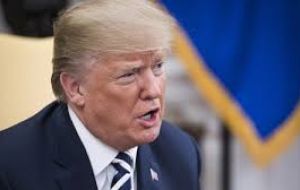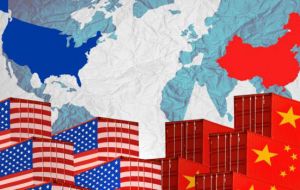MercoPress. South Atlantic News Agency
China bows to fight back Trump's tariffs: “if they want to fight, then we will fight”
 China's new ambassador to UN, Zhang Jun, said Beijing would take “necessary countermeasures” to protect its rights from “an irrational, irresponsible act.”
China's new ambassador to UN, Zhang Jun, said Beijing would take “necessary countermeasures” to protect its rights from “an irrational, irresponsible act.”  “We can't just go and make an even deal with China. We have to go and make a better deal with China,” Trump told reporters at the White House.
“We can't just go and make an even deal with China. We have to go and make a better deal with China,” Trump told reporters at the White House.  Trump stunned financial markets by saying he plans to levy the additional duties starting Sep 1, marking a sudden end to a truce in a year-long trade war
Trump stunned financial markets by saying he plans to levy the additional duties starting Sep 1, marking a sudden end to a truce in a year-long trade war China on Friday vowed to fight back against US President Donald Trump's abrupt decision to slap 10% tariffs on the remaining US$300 billion in Chinese imports, a move that ended a month-long trade truce.
China's new ambassador to the United Nations, Zhang Jun, said Beijing would take “necessary countermeasures” to protect its rights and bluntly described Trump's move as “an irrational, irresponsible act.”
“China's position is very clear that if US wishes to talk, then we will talk, if they want to fight, then we will fight,” Zhang told reporters in New York, also signaling that trade tensions could hurt cooperation between the countries on dealing with North Korea.
Trump said China had to do a lot in order to turn things around in the trade talks and repeated an earlier threat to substantially increase tariffs if they failed to do so.
“We can't just go and make an even deal with China. We have to go and make a better deal with China,” Trump told reporters at the White House.
The US president stunned financial markets on Thursday by saying he plans to levy the additional duties starting Sep 1, marking a sudden end to a truce in a year-long trade war between the world's two biggest economies that has slowed global growth and disrupted supply chains.
US stocks extended their sell-off Friday on Trump's tariff announcement. Yields on US and German debt plumbed multi-year lows amid a rush for safe-haven assets.
Earlier on Friday, Chinese Foreign Ministry spokeswoman Hua Chunying said China was holding firm to its position in the 13-month tariff brawl with the United States.
“We won't accept any maximum pressure, intimidation or blackmail,” Hua told a news briefing in Beijing.
“On the major issues of principle we won't give an inch,” she said, adding that China hoped the United States would “give up its illusions” and return to negotiations based on mutual respect and equality.
Retaliatory measures by China could include tariffs, a ban on the export of rare earths that are used in everything from military equipment to consumer electronics, and penalties against US companies in China, according to analysts.
Trump also threatened to further raise tariffs if Chinese President Xi Jinping fails to move more quickly to strike a trade deal.
The 10 per cent duties, which Trump announced in a series of Twitter posts after his top trade negotiators briefed him on a lack of progress in talks in Shanghai this week, would extend tariffs to nearly all Chinese goods that the United States imports.
White House economic adviser Larry Kudlow told reporters on Friday that the impact on consumers from the latest duties would be minimal, despite the fact that the US$300 billion target list is nearly all consumer goods, from cellphones and laptop computers to toys and footwear.
“The president's not satisfied with the progress on the trade deal,” Kudlow told Fox Business Network.
The tariffs may also force the US Federal Reserve to again cut interest rates to protect the US economy from trade-policy risks, experts said.
The Fed got another possible signal for a second rate cut next month from US July jobs data on Friday, which showed a slowdown in hiring and fewer hours for manufacturing workers.
But new data also showed the US goods trade deficit dipped 0.3 per cent in June to US$55.2 billion in a sign that Trump's tariff policies were restricting trade flows. The goods trade deficit with China shrank 0.8% to US$30 billion with Chinese imports falling 0.7% and US exports to China unchanged.
US Trade Representative Robert Lighthizer and Treasury Secretary Steven Mnuchin briefed Trump earlier this week on their first face-to-face meeting with Chinese officials since Trump met Xi at the G20 summit at the end of June and agreed to a ceasefire in the trade war.
Previous negotiations collapsed in May, when US officials accused China of backing away from earlier commitments.




Top Comments
Disclaimer & comment rulesCommenting for this story is now closed.
If you have a Facebook account, become a fan and comment on our Facebook Page!